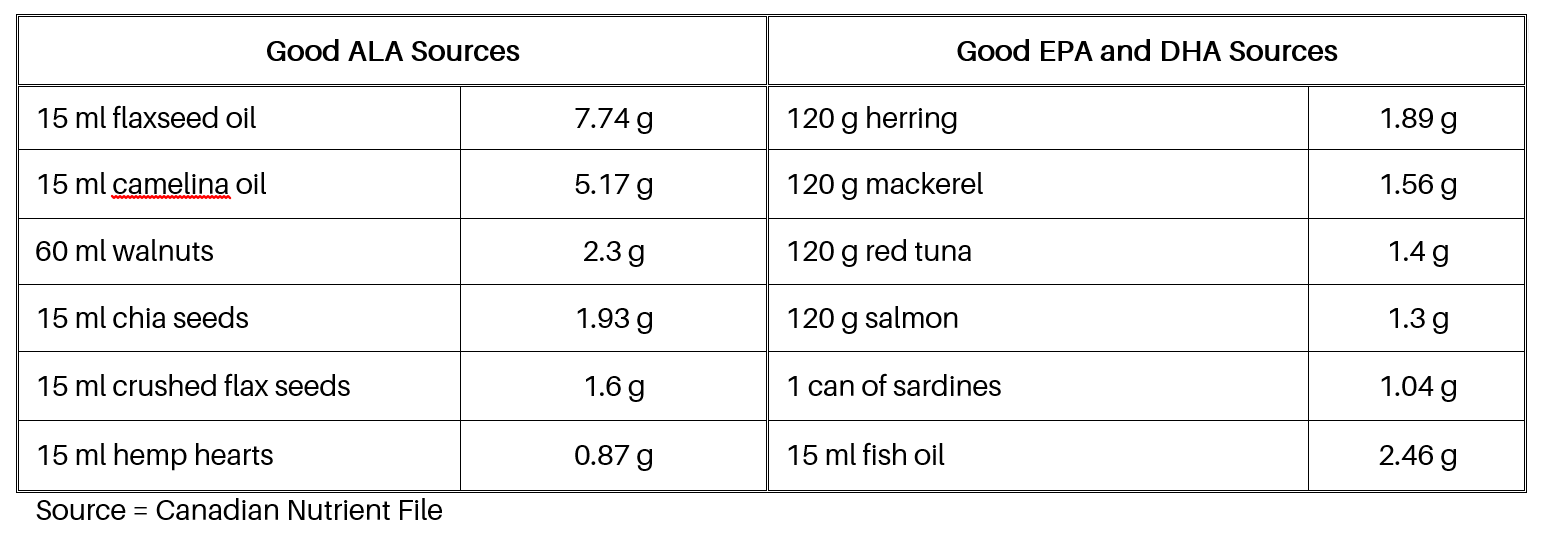
Omega-3 and omega-6 are polyunsaturated fats (also called “healthy fats”). Their benefits have long been proven, in particular when it comes to heart and brain health, as well as mood issues. However, we still struggle to eat enough of them. Let’s explore this topic further.
The disrupted occidental diet is clearly at the root of the epidemics of diseases we are currently experiencing. The imbalance between omega-3 and omega-6 intake is an integral part of the problem.[1] Generally speaking, we consume way too much omega-6 in relation to our omega-3 intake.
To restore a proper omega-3/omega-6 ratio, we should eat more fatty fish as they are without a doubt a great source of the best types of omega-3 (EPA and DHA), and then supplement with vegetable sources (ALA). Indeed, marine omega-3 is more effective. Some products enriched with omega-3 can also be handy to increase our daily intake, but we can’t rely exclusively on them to meet our daily needs. And beware of marketing pitfalls; juice with added omega-3 still contains the same amount of sugar.

Integrate fish into at least two meals of your weekly menu. Ideally, don’t pick fried or battered fish (as it contains more omega-6). For example, try this easy-to-prepare steak spice salmon recipe with only 3 ingredients: http://cuisinefuteeparentspresses.telequebec.tv/recettes/93/saumon-aux-epices-a-steak. For the most adventurous, savour this mango-lime salmon tartar: http://www.nautilusplus.com/fr/tartare-de-thon-mangue-et-lime/. You’ll be proud to get your daily omega-3 intake.
Add fish, flaxseed, or camelina oil to your salad dressings and smoothies. They’re all high in omega-3, but beware! Avoid exposing them to light and heat as they are very fragile and will quickly oxidize.
Only use supplements if they are recommended by your physician or nutritionist. After all, food has plenty of benefits to offer. And you, how do you meet your omega-3 needs?
Dominique Longpré, P.Dt.
SOURCES
Kris-Etherton PM et al. Fish consumption, fish oil, omega-3 fatty acids, and cardiovascular disease. Circulation. 2002 November 19;106(21):2747-57. Full text: http://circ.ahajournals.org
Passeport-santé websitehttp://www.passeportsante.net/fr/Solutions/PlantesSupplements/Fiche.aspx?doc=acides_gras_essentiels_ps
The Université de Montréal’s reference website on nutrition http://www.extenso.org/article/le-point-sur-les-acides-gras-omega-3/ and http://www.extenso.org/article/la-peche-aux-omega-3/
Diabetes Québec website http://www.diabete.qc.ca/fr/vivre-avec-le-diabete/alimentation/alimentation-et-nutriments/les-acides-gras-omega-3
[1]. Simopoulos AP. Essential fatty acids in health and chronic disease. Am J Clin Nutr. 1999 Sep;70(3 Suppl):560S-569S. Review. Full text: www.ajcn.org
Do you eat enough omega-3? is a post from Nautilus Plus. The Nautilus Plus blog aims to help people in their journey to fitness through articles on training, nutrition, motivation, exercise and healthy recipes.
Copyright © Nautilus Plus 2017

